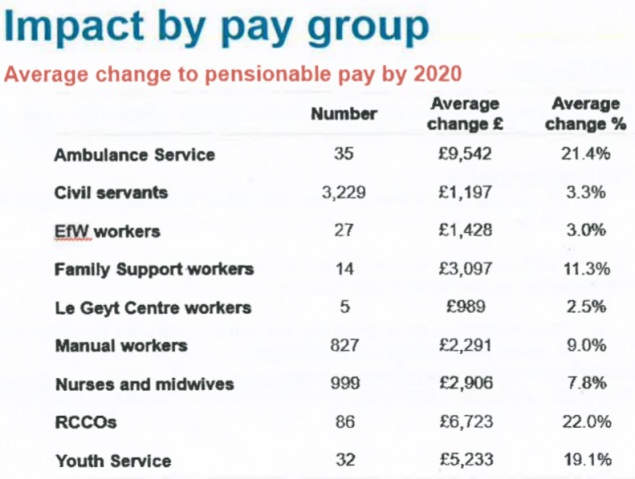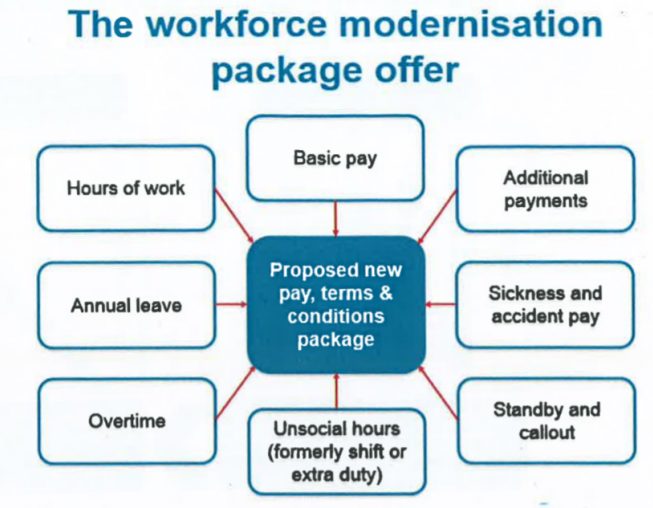

More than 5,000 States workers are today discovering how their terms and conditions are set to change, with the majority likely to see their pensionable pay falling behind increases in the cost of living.
The States are releasing details of the first phase of their long-anticipated ‘Workforce Modernisation Programme’, which is being billed as the biggest shake-up to services in a generation. It comes in the week the former Chief Executive of the States, John Richardson, retired six months ahead of schedule, with his replacement Charlie Parker - supported by four UK consultants - beginning their work early.
The States team behind the changes say that 96% of the workers affected will see a pensionable pay 'rise', with the annual increases locked in until 2020. Pensionable pay includes regular, and permanent, payments which are recognised by the pension scheme - including basic pay and shift pay for example, but not overtime, which would be extra.
But that pay 'rise' doesn't take into account annual increases in the cost of living which might outstrip it - meanwhile, 185 staff will actually see their pensionable pay fall, a drop which will only be exacerbated by inflation.
In terms of pay, 35 paramedics and 86 'live-in' child care workers are set to be the winners of the new plans, with their pensionable pay rising by 21% and 22% respectively by 2020 - £9,542 and £6,723 on average - before inflation is taken into account.
32 people working for the Youth Service will also see a pensionable pay increase of nearly one fifth (£5,233 on average), over the same period, again not including increases in the cost of living.
But for the majority, it’s not such good news. 3,229 civil servants are being offered an increase of 3.3% in pensionable pay in total by 2020, which is very unlikely to keep pace with inflation. If the cost of living continues to rise by around 3% year-on-year – as it did in the last quarter – then those thousands of civil servants, along with nurses and midwives and manual workers could actually see their pay fall by 2020.

Pictured: a breakdown of the average changes by 2020 for different pay groups. Inflation is not included.
An unexpected shock such as Brexit could push up the cost of living even further, however. In 2008, the inflation rate soared as high as 6.4% following the economic downturn.
Basic pay is only one part of the proposed changes, which also affect working hours, overtime and sickness and accident pay. The States say the changes will cost £47m but that figure doesn't include any savings which might result.
Employees were today invited to log on to an online system to discover the terms of their new offer.
Senator Andrew Green, Chair of the States Employment Board and Deputy Chief Minister, said that the overhaul was an attempt to sort out a pay system that had become out of control – over decades, 75 pay grades had emerged with more than 20 sets of terms and conditions. The reforms will see these merged into a single system of just 10 pay bands and one set of terms and conditions for all employees. Five separate maternity leave systems will also be brought into one.

Pictured: the different elements of the new offer.
“These changes will mean fairer and more consistent treatment for employees doing the same type of job across the public sector. We are tackling historical inconsistencies and preparing our organisation for the future,” Senator Green commented.
While each individual will receive a personal offer depending on the circumstances of their job, union leaders have been invited to vote on the new single set of terms and conditions.
Today's offer is the first phase of changes, with a second phase involving teachers, executives, the police, prison officers and the fire service still to come.
In a memo sent out this week, which has been seen by Express, Unite the Union leader Nick Corbel set out the battle lines, warning that they had three main areas of concern with the new proposals:
"1. The current job evaluation scheme does not provide a solution that meets the aim of “equal pay for work of equal value”. All that is happening is entire pay groups are being migrated into a new pay spine without any changes to fit how they were evaluated.
2. The employers final offer means all pay increases will be included in the new WFM [Workforce Modernisation] package and many will receive further below RPI increases during this period as well as some not receiving any increases at all. All Unions are agreed that pay negotiations must remain outside WFM and be undertaken annually.
3. The effect on employees pensions is not yet fully understood and changes within WFM are currently outside the provisions of the pensions scheme legislation so must be confirmed and any changes in place before this can be accepted."
Comments
Comments on this story express the views of the commentator only, not Bailiwick Publishing. We are unable to guarantee the accuracy of any of those comments.